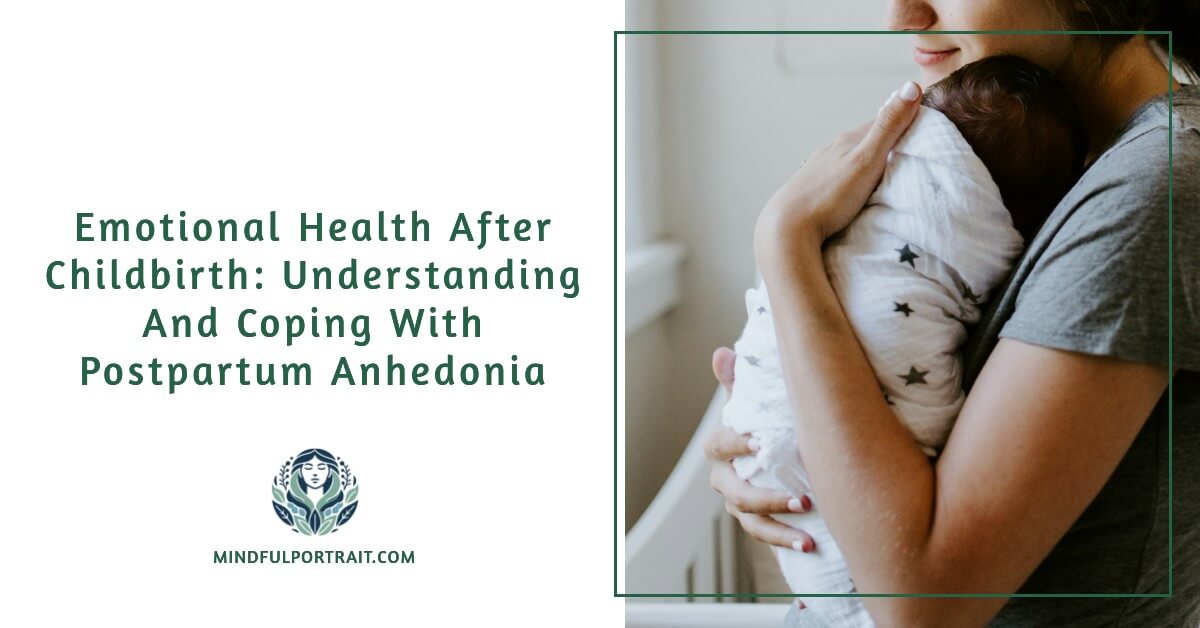Postpartum Anhedonia is not uncommon but often misunderstood or ignored. Have you ever felt like you are just wasting your time, even when doing the things you used to enjoy? Your favorite playlist, once a source of joy, now just background noise? It’s perfectly normal for humans to evolve and change priorities and preferences, especially after becoming a mother. But what if this disinterest persists in every corner of your life?
By this time, you might have asked yourself why you are not able to bond with your baby even after months of motherhood. The idea of vacations, family time, outings, movies—it all feels overhyped. It’s time to pause, reflect, and share your feelings with someone. Is it just tiredness from the growing responsibilities of being a mom, or are you experiencing anhedonia?
Disclaimer: This article is for informational purposes only and is not a substitute for medical advice. If you or someone you know is experiencing postpartum mental health challenges, consult a healthcare provider or mental health professional for proper diagnosis and treatment.
What is Anhedonia?
Anhedonia is the inability to experience pleasure, a common symptom of depression. However, it doesn’t always mean you are depressed. You might be experiencing postpartum depression, post-traumatic stress disorder (especially if you are a first-time mom who had a traumatic delivery or NICU stay), or just anhedonia.
Possible Causes
- Underlying Mental Illness: In most postpartum mood disorders, anhedonia emerges as a prevalent symptom. It can be an indicator of postpartum depression, anxiety, or other mental health disorders.
- Normal Hormonal Changes After Childbirth: The estrogen-progesterone hormonal shift happening after childbirth leads to baby blues—mood swings, confusion, fatigue, etc. Without emotional support, these conditions can turn into anhedonia.
- Sleep Deprivation: One of the most challenging factors faced by new mothers. Studies have proven that sleep deprivation can directly impact a person’s mental health.
- Stress: Most moms don’t get the chance to fully experience the joy of their baby’s birth, especially first-time moms, those who had traumatic deliveries, those with breastfeeding issues, or their baby’s health problems, and those lacking a support system.
- Dopamine Dysregulation: Research suggests anhedonia is connected to problems with dopamine and its receptors.
- Vitamin D Deficiency: Postpartum anhedonia can be due to decreased Vitamin D levels in the body, especially in new moms who stay indoors without proper sunlight exposure and skip supplements.
- Hypothyroidism: There is a chance of postpartum thyroiditis, which eventually turns into hypothyroidism, a condition that includes anhedonia as a symptom.
Symptoms of Postpartum Anhedonia
- Emotional numbness when being around the child
- Feeling emptiness and a lack of motivation in motherhood
- Parenting becomes burdensome without any moments of enjoyment
- Feeling constantly guilty for being a ‘bad mother’
- Difficulty spending time with people
- Unable to experience pleasure in sexual activities after delivery
- Avoiding putting any effort into finding time to spend with the partner
How to Help Yourself
- Reflect on Your Thoughts: Identifying the condition is challenging. There is a high chance that anhedonia can go unnoticed for years. Take a break, sip your tea, and utilize your mindful time. Step back from social media and take time to talk to yourself. Try journaling. Mild cases can be prevented by living mindfully and being around emotionally available people.
- Focus on Self-care: Try to get some sleep, fresh air, proper nutrition, and exercise. These factors can help fight fatigue, hormone imbalances, and neurotransmitter dysregulations.
- Connect with Other Mothers: No one can understand your situation like a fellow mother. Reach out, connect with other mothers, and build a strong community.
- Talk to a Trustworthy Person: Share your feelings with your partner, a friend, or a therapist. Don’t hesitate to seek help. Keeping things to yourself can complicate matters.
- Get Professional Help: Early recognition and intervention are crucial for avoiding complications and improving the quality of life. Sometimes, you might overlook postpartum depression due to the lack of obvious symptoms. Therefore, addressing postpartum anhedonia is important. A mental health professional can differentiate your condition, rule out the underlying causes, and provide proper guidance or treatments accordingly.
Challenges in Diagnosing Postpartum Anhedonia:
- Sometimes, the symptoms are subtle and can be misinterpreted as fatigue and the stress of new parenting responsibilities. Women tend to overlook the condition until prominent features of the associated disorder appear.
- Mild postpartum depression with anhedonia as the main symptom can go unaddressed due to social stigma and the lack of genuine relationships.
- Anhedonia can persist even after the treatment of postpartum depression due to the lack of follow-up or improper communication with the therapist.
Importance of Seeking Help for Postpartum Mental Health
Due to social stigma, busy schedules, and changing priorities, it’s tempting for a woman to keep such problems to herself. Many times, people around her, even her partner, fail to understand her and normalize her silent struggles. But it is important to give support to new mothers and focus on their mental health after childbirth for several reasons:
- Long-term Complications: Mental health issues, left untreated, can turn into chronic illness or even lead to life-threatening complications for both mother and child.
- Impact on Child: A mother’s mental health can affect the overall development of the child, considering the parenting style, emotional attachment, and family atmosphere. Her health can affect her ability to connect with the newborn and her natural caregiving abilities. Lack of healthy bonding between mother and child can directly affect the child’s social and emotional development.
- Family Dynamics: Issues with the regulation of emotions and lack of communication can strain relationships with partners.
Reflections from MindfulPortrait

It’s high time we, as women, started discussing our mental health with the same importance we give to our children’s health. Let’s help each other and form support groups for postpartum mood disorders.

